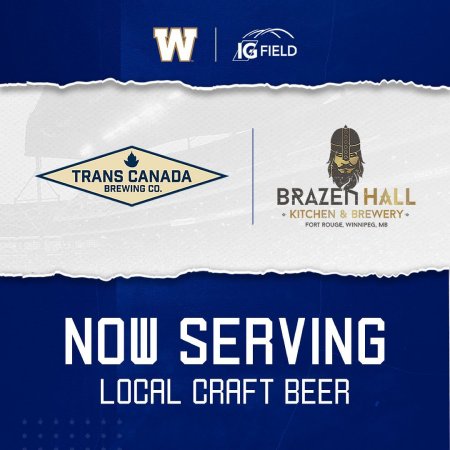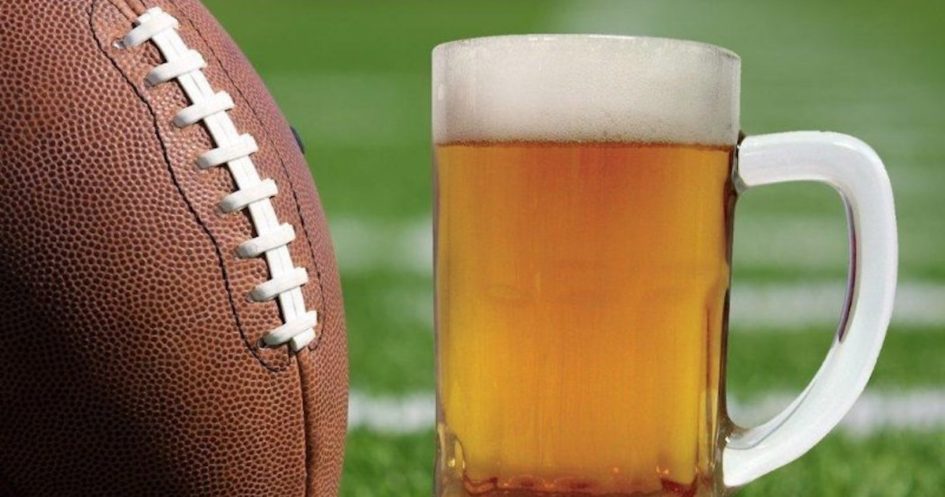Last week the Canadian Football League’s (CFL) Winnipeg Blue Bombers announced that they will serve beer from two local breweries starting this (truncated) season. This is good news for the craft beer industry in Manitoba. But, in the larger picture, it is a drop in the bucket and we need to do more. I did my last CBC column on the topic, which you can listen to here.
At select “Home Grown” concession stands in the stadium beer from Trans Canada Brewing and Brazen Hall Brewing will be served alongside local food offerings. Molson remains the corporate beer sponsor of record and will still have the dominant positioning in the stadium.
According to my research the Bombers are the fourth CFL team to offer local beer (info on this can be hard to track down). The Hamilton Tiger Cats have a craft beer garden area that serves Bench Brewing. Ottawa offers Big Rig Brewing beer at some of its concessions. And the Saskatchewan Roughriders have Craft Beer Corner, a single concession that offers beer from a rotating list of local breweries (10 breweries are participating this coming year). In all cases one of the big corporate breweries is the corporate sponsor and gets the bulk of the tap lines and promotion.
This is good news for the local breweries involved and fans in those cities, but you will forgive me if I hold my applause. These initiatives are a good first step but they are not without issues.
First, access to the local offerings is restricted to specific areas or concessions – you have to seek them out. Often demand outstrips supply (and the deal with the team restricts the quantity of beer available), meaning line-ups are long and the local beer can run out well before the end of the game.
Also, the corporate sponsorship agreements with the corporate breweries limits how much promotion the local breweries can do around this arrangement. They have no or limited access to team branding in their promotions and their visibility at the stadium is limited. It is great to sell your beer to thirsty football fans, but the benefit is dampened if you can’t share in the team’s overall promotions.
If we look to the U.S. we can see that so much more is possible. Craft beer is available in dozens of stadiums and arenas across the U.S. And not just available in some tucked away nook. In some places craft is the dominant product. Many teams partner with local breweries to create team-branded beer for sale during games. Others have brewpubs located inside the stadium. Some have even gone so far as to install actual breweries onsite. Baseball and soccer teams seem to have embraced craft the most.
In contrast, Canada pales. Only in the last couple years has a smattering of craft options been available at Oilers games (Lagunitas and Molson-owned Granville Island) with nothing local, for example. And many arenas are craft beer wastelands. That is why the creep of craft into CFL stadiums is both encouraging and painfully slow.
The main barrier to expanded local options is the corporate sponsorship contracts sports teams sign with the big corporate breweries. The two big players in Canada, Molson (Molson Coors) and Labatt (ABInbev) are in constant battle to pay to become the exclusive beer partner for sports teams. To the winner comes official use of team logos in promotions, partnering on joint promotions, tonnes of advertising in the arena/stadium, and a captive consumer during games to sell thousands of pints. These deals are worth hundreds of thousands to sports teams in revenue and millions to the breweries in advertising and sales.
By allowing other breweries on the premises, it undermines the value of the sponsorship to the brewery. That is why where we do see local craft there are strict limitations on volume, visibility and access. But that is not to say it is impossible.

Looking just at the CFL, Labatt has sponsorships with four teams (B.C., Toronto, Ottawa, Montreal), while Molson has five (Edmonton, Calgary, Saskatchewan, Winnipeg, Hamilton). I mention this because the four teams that offer craft span both big breweries. Both corporations have been prepared to amend their agreements at times.
So, why haven’t the other five CFL teams gotten on board? This is speculation on my part but I think it comes down to two things. The first is the team’s perception of customer demand and what they need to do to attract younger fans (which they are all trying to do). Some organizations, like the newly renamed Edmonton Elks have targeted families through their promotions. The Toronto Argonauts are focused on replicating a soccer-game atmosphere. It is possible the four teams with local craft beer want to project a more urban, more locally connected image to attract fans. It might be about organizational priorities.
Also, I can’t help but notice the four teams with craft beer also have stadiums built (or substantially renovated) in the past decade. Newer stadiums are designed to improve fan experience and usually have more modern amenities, including restaurants, beer gardens and the like. The extra flexibility both encourages and permits more creative use of the space, opening the door to craft options. Trying to line-up to get local craft beer in the cramped concourses of McMahon Stadium (as an example) would be no fun at all.
But old stadiums is not a valid excuse. Multiple strategies to increase appeal are impossible. I suspect much of it comes down to the organizations’ willingness to have the difficult negotiations with their current beer sponsor to re-open the contract to allow craft options.
I think the perception of the corporate breweries’ reluctance is outdated. Both have their own craft-y brands and in the deals we have seen to date they have happily added their own beer into the mix of craft offerings, bolstering their brands and further sowing confusion about what craft beer is.
Also, the argument that local craft breweries cannot suppl y such big events is also outdated. For one thing in the existing deals volumes are capped, so they are not being asked to supply every beer sold. Even if they got a bigger share of the pie, they could handle it. Looking at the Edmonton and Calgary brewing scenes, I think there are a number of breweries that could and would supply beer to games, especially if a multi-brewery model like Regina’s is adopted. And you are telling me that you can’t find a brewery in Toronto, Montreal or Vancouver able to meet demand?
This issue is no longer about the viability of providing local craft beer. It is about conservative organization’s reluctant to listen to calls for greater local options out of fear of upsetting their corporate sponsorship apple cart.
Football fans who are also craft beer fans should be emailing their local team demanding more local craft beer options at games. My guess is that it won’t take much to get them to listen. I suspect the NHL teams will be a tougher nut as they are less community-focused and more money is at stake.
Once we get that done we can start talking about stadium brewpubs!



Leave a Reply